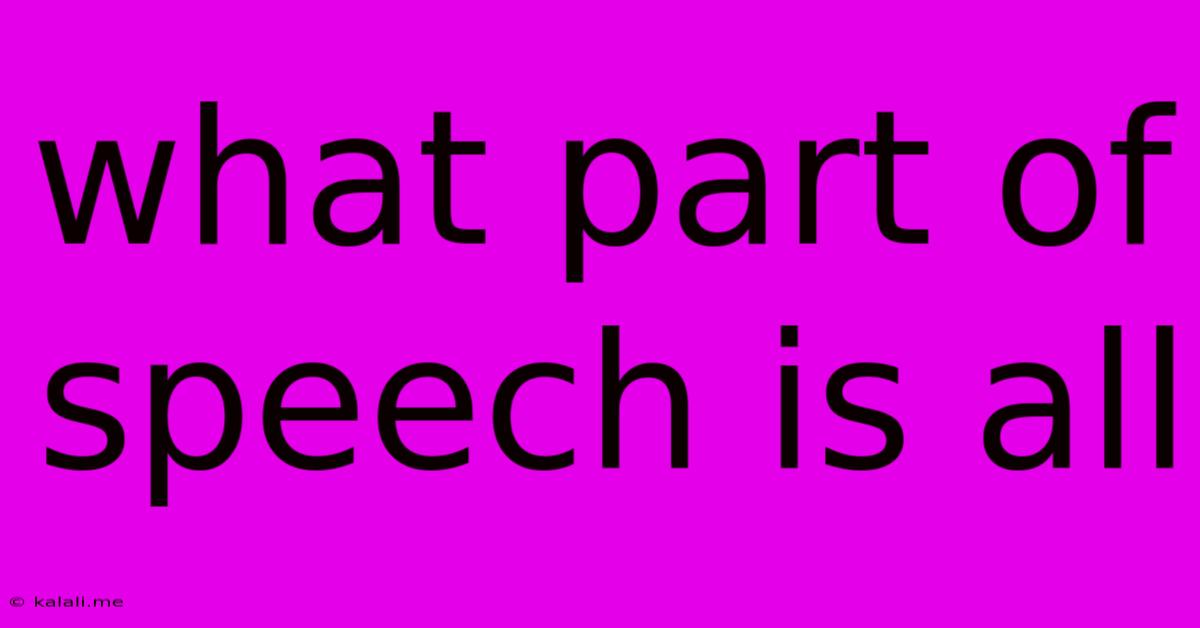What Part Of Speech Is All
Kalali
May 25, 2025 · 3 min read

Table of Contents
What Part of Speech Is "All"? Unlocking the Versatile Nature of "All"
The word "all" is a fascinating example of English's flexible grammar. While it might seem straightforward at first glance, understanding its true grammatical function requires a closer look at its diverse uses within sentences. This article delves into the multifaceted nature of "all," exploring its various parts of speech and offering clear examples to illuminate its usage.
All as a Determiner/Pronoun
In many cases, "all" acts as a determiner, modifying a noun. It indicates the totality of something. Think of it as a quantifier, specifying the entirety of a group or amount.
- Examples: All the students passed the exam. All cats are mammals. All my friends are coming to the party.
In these sentences, "all" directly modifies the nouns "students," "cats," and "friends," respectively, specifying the complete set.
"All" can also function as a pronoun, representing a noun phrase. In this case, it stands in for a previously mentioned or implied noun.
- Examples: All is well that ends well. All are invited to the celebration. I gave it my all.
Here, "all" replaces a more specific noun phrase like "everything," "everyone," or "my entire effort." Note how the verb conjugation changes ("are" instead of "is") to agree with the plurality implied by "all."
All as an Adjective
While less common, "all" can occasionally function as an adjective, describing a noun. This usage usually implies "entire" or "complete."
- Example: The all-consuming fire destroyed the building.
In this example, "all-consuming" acts as a compound adjective, with "all" contributing to the meaning of "completely consuming." This usage is often seen with compound adjectives modifying nouns.
All as an Adverb
"All" can also act as an adverb, modifying a verb, adjective, or another adverb. It often emphasizes the completeness or totality of an action or quality.
- Examples: The rain fell all night. (modifies the verb "fell") He was all too happy to leave. (modifies the adjective "happy") She worked all the harder after the criticism. (modifies the adverb "harder")
In these examples, "all" intensifies or specifies the extent of the action or quality. It shows the duration of the rain, the degree of happiness, and the increased effort in working.
Distinguishing "All" from Similar Words
It's important to distinguish "all" from similar words like "every," "each," and "whole." While overlapping in meaning, they differ subtly:
- All: Refers to a group as a complete entity.
- Every: Refers to each individual member of a group.
- Each: Highlights individuality within a group.
- Whole: Emphasizes completeness or entirety as a single unit.
Understanding these nuances is crucial for accurate and effective communication.
Mastering the Versatile "All"
The word "all" is a truly versatile word in the English language, capable of acting as a determiner, pronoun, adjective, and adverb. Its grammatical function depends heavily on its context within a sentence. By understanding these different roles, you can use "all" precisely and effectively in your writing and speaking, adding depth and clarity to your communication. Knowing its grammatical capabilities opens up a world of nuanced expression.
Latest Posts
Latest Posts
-
How Long Can Salmon Sit Out
May 25, 2025
-
I Would Love Too Or To
May 25, 2025
-
How Do You Clean The Jets In A Whirlpool Tub
May 25, 2025
-
Makre No Rule To Make Target
May 25, 2025
-
How To Get Rust Stains Out Of Concrete
May 25, 2025
Related Post
Thank you for visiting our website which covers about What Part Of Speech Is All . We hope the information provided has been useful to you. Feel free to contact us if you have any questions or need further assistance. See you next time and don't miss to bookmark.